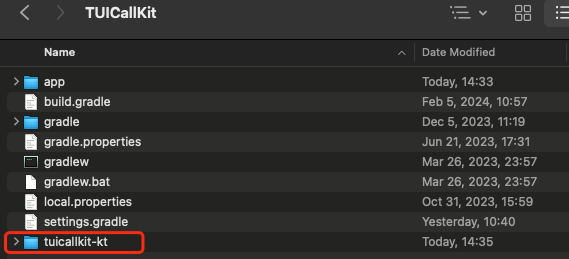Android
Supported Languages
Currently supports Simplified Chinese, English, Japanese, and Arabic.
Switch Language
TUICallKit Default Language matches the mobile system. If you need to switch languages, you can use
TUIThemeManager.getInstance().changeLanguage to change the language. For example, to switch to English:…import com.tencent.qcloud.tuicore.TUIThemeManager;public class MainActivity extends BaseActivity {@Override public void onCreate(Bundle savedInstanceState) { super.onCreate(savedInstanceState);TUIThemeManager.getInstance().changeLanguage(getApplicationContext(), "en");…}…}
Add New Language
Step 1: Source Code Integration
1. Clone or download the code from GitHub, then copy the tuicallkit-kt subdirectory under the Android directory to the same level under your current project's app directory, as shown below.

2. Find the
settings.gradle.kts (or settings.gradle) file in your project's root directory, add the following code to import the tuicallkit-kt component into your project.include(":tuicallkit-kt")
include ':tuicallkit-kt'
3. In the app directory, find the
build.gradle.kts (or build.gradle) file, add the following code in the dependencies section to declare the current app's dependency on the newly added component.dependencies {api(project(":tuicallkit-kt"))}
dependencies {api project(':tuicallkit-kt')}
Step 2: Add a new language pack
Using Spanish as an example:
1. Add a new Spanish language file.
Navigate to the
TUICallKit source code file directory under the src/main/res directory, and add a new value-es/strings.xml file .2. Copy the contents of
src/main/res/values-en/strings.xml to the newly added src/main/res/values-es/strings.xml file.3. Translate the English in
src/main/res/values-es/strings.xml to Spanish.4. Add new language.
…import com.tencent.qcloud.tuicore.TUIThemeManager;public class MainActivity extends BaseActivity {@Overridepublic void onCreate(Bundle savedInstanceState) {super.onCreate(savedInstanceState);Locale locale = new Locale("es"); TUIThemeManager.addLanguage("es", locale);…}…}